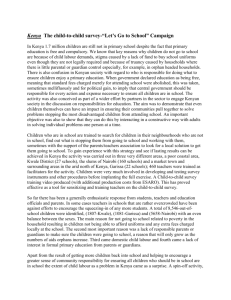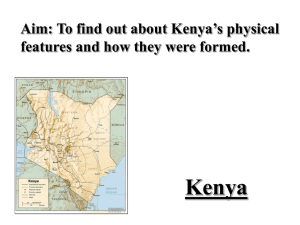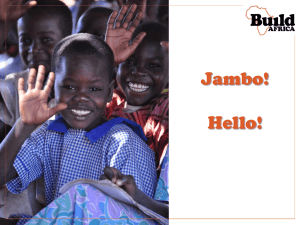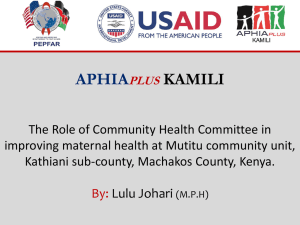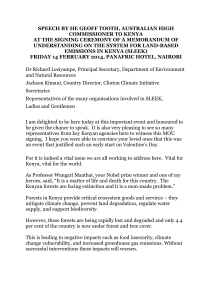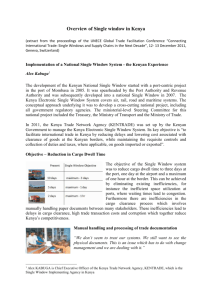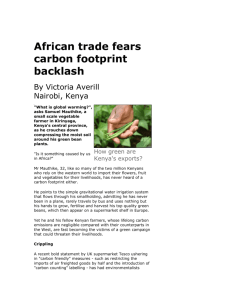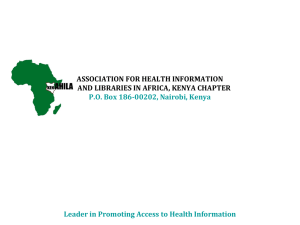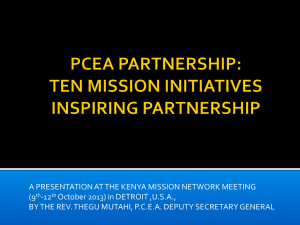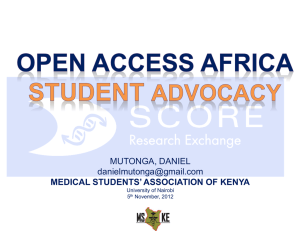Kenya - The Millennium Project
advertisement
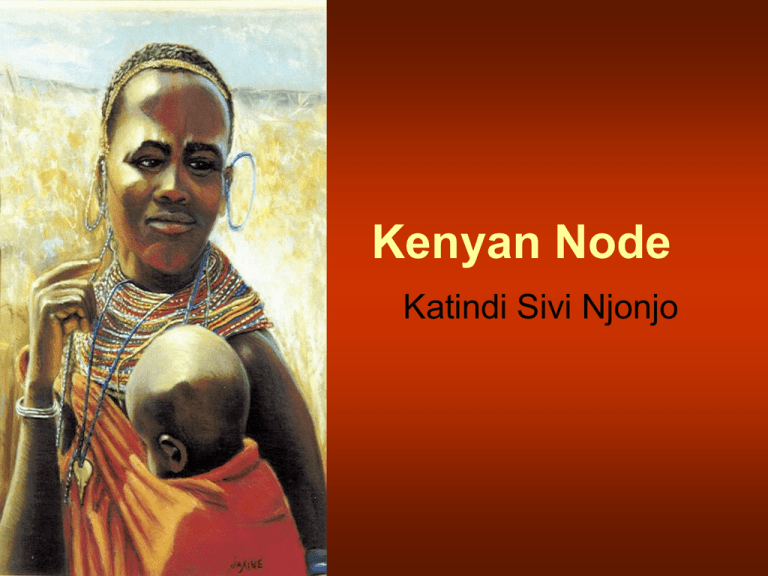
Kenyan Node Katindi Sivi Njonjo About IEA Budget Information Programme Focuses on analysing the national budget What is it? • Think tank • Doing policy analysis and research • It is non partisan…no political or any party affiliation • It is a membership organization Regulation programme Focuses on the legal framework governing economic activity Trade Information Programme Focuses on regional and international trade relations Futures Programme Focuses on Utilization of futures methodologies for research and policy analysis Kenyan Node Goals for 2011 • Research • Scenarios Building • Policy Advocacy Future Effect of Kenya’s Youth Bulge Mazingira scenarios Research into Kenya’s Youth Bulge • Documented the state of youth in Kenya • Compiling a research compendium with the following papers: 1. Demographics 2. Health 3. Education 4. Political participation 5. Family 6. Un/employment 7. ICT and international Migration 8. Crime 9. Vigilantism 10. Entertainment 11. Sports • Conducting countrywide scenarios conversations Main Message 1: Future Effects of Kenya’s Youth Bulge 1970 2010 2030 2050 Source: Kenya National Bureau of Statistics, UN • Kenya’s population is increasing by 1M annually • Though women are giving birth later, to fewer children and spacing them more • Demographic structure is changing and has various implications of Kenya’s political, economic and social stability • Phenomenon will create a youth bulge in 10 years Future Implications Political implications 1. Demographic trends are likely to exacerbate youth violence (through gangs, vigilante groupings and militia groupings) Economic Implications 1. Demographics trends will trigger low economic performance av. 3.6% due to high dependency 2. Exacerbate unemployment beyond the current 25% rate 3. High cost of living and especially high food prices is causing major disillusionment and will be an eventual trigger of violence Social implications 1. Overpopulation and overcrowding (2010 - 40M, 2030 – 60M) 2. High rural – urban migration 3. Rapid Urbanization & increased slums and pollution 4. Increase in resource conflicts 5. High crime rates Main Message 2: Future Effects of Kenya’s Reproductive Health • Dangerous trends due to risky sexual behavior hence: 1. High teenage pregnancies (1 out of 4 children born in Kenya are unplanned for) thus contributing to high pop 2. Rising HIV and STI infection rates and risk having high mortality rates of Kenya’s workforce in the future % of teenagers who have began child bearing 36.2 26.2 16.5 9.4 2.1 15 16 17 Age 18 19 Achievements 1.Presented youth facts to over 1000 multistakeholders 2.Influenced some UN agencies programming. They are revising their interventions (poured a lot of money in rural areas whereas in some cases, the need is in urban areas or slums) 3.Young people are tokenized and manipulated. This work is passing the message that this is not sustainable leading to prioritization of youth issues religious leaders, donors and policy makers (especially in preparation to next years elections) 4.Influenced the prime ministers youth round table and employment summit 5.Popularizing issues of demographics and reproductive health for political stability Dissemination Strategy 1. Using social media to popularize the work among the youth mainly facebook and twitter 2. Using dramaturgy to encourage creativity in scenarios building among youth 3. Recording all conversations and will be producing a documentary of the stories Possible youth scenarios in Kenya • Held 9 scenarios workshops in Kenya’s provinces (about 200 young people) ? Technology Main driving forces • All teams chose governance (public participation, constitutionalism, political leadership) • 5 chose technology, • 2 chose unemployment, 2 chose access to relevant and quality education • 1 chose globalization • 1 chose the cost of living • 1 chose the land tenure system. ? Governance ? ? Policy Proposals • Policies should be geared towards achieving a favorable age structure i.e. A large proportion of the population comprised of workingage adults, with smaller proportions and slower growth of dependent populations children and older adults Strategy 1. Adequate Investment in Reproductive Health i.e. reduce the unmet need for family planning 2. Improve education of the girl child which has a direct co-relation with early marriages, child and maternal mortality rates etc 3. Adequate and Relevant Education to prepare youth for meaningful employment 4. Urbanization policies Environmental scenarios • Could not get funding because of donor focus on reform programmes 1.Implementing the new constitution 2.TJRC 3.Electoral reforms • ILRI conducting a big environmental study • Oxford contacts trying to link me up with the scenarios phase of the project • I may need to synergize with the if there is room. Asante Sana!

